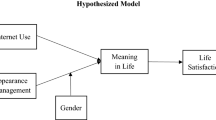Abstract
Background/Objectives This study wants to test dual mediating effect of self-efficacy and body image in the relation between appearance management behavior and life satisfaction of the elderly in Korea. Methods/Statistical analysis The research objects of this study are 363 old men and women residing in South Korea. The survey was conducted in July and August in 2019. To examine relationship among variables like appearance management behavior, self-efficacy, body image, and life satisfaction, this study conducted correlation analysis. And to examine the relationship between appearance management behavior and life satisfaction, it uses Model 4 of SPSS PROCESS macro. Findings First, it was found that correlations among all the variables were significant. While the mean value (2.793) of appearance management behavior was a little lower than median, those of other variables were higher than median: self-efficacy (3.486), body image (3.070), and life satisfaction (3.312). Second, appearance management behavior has positive effect on life satisfaction. Third, in the relationship between appearance management behavior and life satisfaction, self-efficacy and body image were found to have full mediating effects. Based on such findings, this study suggested ways to improve life satisfaction by improving self-efficacy and body image. Improvements/Applications To improve life satisfaction of the elderly, it is more important to raise self-efficacy and have positive image of one’s body than making efforts in appearance management. And it is necessary for old people to actively manage their aging bodies, which will positively change their body images, improving their life quality.
Access this chapter
Tax calculation will be finalised at checkout
Purchases are for personal use only
Similar content being viewed by others
References
Kostat. Demographic Trend (2019). http://kostat.go.kr/portal/korea/index.action
Park, S.J., Kim, K.H.: The effects of appearance management behavior by women on psychological happiness and self-efficiency. J. Korean Soc. Knit Design 17(1), 35–46 (2019)
Lee, Y.J., Seo, B.I.: Research on types of the old caring appearances according to their self-esteem and perception of physical attraction. J. Korean Acad. Health Welfare Elderly 29(2), 59–75 (2010)
Cox, C.L., Glick, W.H.: Resume evaluations and cosmetics use: When more is not better. Sex Roles 14(1–2), 51–58 (1986)
Park, Y.R., Son, Y.J.: Relationship of satisfaction with appearance, self-Esteem, depression, and stress to health related quality of life in women across the lifespan. Korean J. Fund. Nursing 16(3), 353–361 (2009)
Ryoo, H.H., Jung, Y.: The relationship between body-consciousness and appearance management behavior of older women. J. Beauty Industry 3(1), 1–19 (2011)
Lee, S.J., Park, K.S.: Appearance management behaviors of female university students by self-efficacy and self-esteem. Costume Culture Assoc. 19(5), 1075–1087 (2011)
Jang, H.S.: Influences of body image and physical appearance management behavior on psychological stability. Doctorial Thesis. SeoKyung University (2014). Available from: https://scholar.google.co.kr/scholar?hl=ko&as_sdt=0%2C5&q=Influences+of+body+image+and+physical+appearance+management+behavior+on+psychological+stability&btnG=
Bandura, A.: Self-efficacy: The exercise of control. W. H. Freeman, New York (1997)
Jo, K.Y., Yoo, T.S.: The mutual relations of self–efficacy proximity of cosmetics the self and proximith of clothing to self. J. Korean Soc. Costume 32, 183–200 (1997)
Fobair, P., Stewart, S.L., Chang, S., D’Onofrio, C., Banks, P.J., Bloom, J.R.: Body image and sexual problems in young women with breast cancer. Psycho-Oncol. 15(7), 579–594 (2006)
Cohen, S.: Psychosocial models of the role of social support in the etiology of physical disease. Health Psychol. 7(3), 269 (1988)
Kim, E.G., Lim, S.H., Nam, I.S.: Effect of sociocultural attitudes toward appearance of depression and psychological well-being of fitness participating adult woman. J. Korea Acad.-Ind. Cooperation Soc. 16(1), 354–364 (2005)
Song, M.K., Ha, J.H., Park, D.H., Ryu, S.H., Oh, J.H., Yu, J.H., et al.: Effect of body image and eating attitude on depressive mood and suicide ideation in female adolescents. Korean J. Psychosom. Med. 18(1), 40–47 (2010)
McAuley, E., Konopack, J.F., Motl, R.W., Morris, K.S., Doerksen, S.E., Rosengren, K.R., et al.: Physical activity and quality of life in older adults: influence of health status and self-efficacy. Ann. Behav. Med. 31(1), 99 (2006)
Cash, T.F., Pruzinsky, T.: Future challenges for body image theory, research, and clinical practice. Body image: A handbook of theory, research, and clinical practice, pp. 509–516 (2002)
Kim, J.W.: The correlation of the body image satisfaction and the appearance caring behavior of mid-aged women regarding the propensity to narcissism. [Doctorial Thesis]. DaeGu University (2010). Available from: https://scholar.google.co.kr/scholar?hl=ko&as_sdt=0%2C5&q=The+correlation+of+the+body+image+satisfaction+and+the+appearance+caring+behavior+of+mid-aged+women+regarding+the+propensity+to+narcissism&btnG=
Diener, E.D., Emmons, R.A., Larsen, R.J., Griffin, S.: The satisfaction with life scale. J. Pers. Assess. 49(1), 71–75 (1985)
Hayes, A.F.: Partial, conditional, and moderated moderated mediation: quantification, inference, and interpretation. Commun. Monographs 85(1), 4–40 (2018)
Acknowledgements
This paper was supported by the Graduate Student Support Project of Hanseo University in 2019.
Author information
Authors and Affiliations
Corresponding author
Editor information
Editors and Affiliations
Rights and permissions
Copyright information
© 2021 Springer Nature Singapore Pte Ltd.
About this chapter
Cite this chapter
Bae, JS., Kim, YJ., Lee, SJ. (2021). Double Mediating Effects of Self-efficacy and Body Image in the Effect of Appearance Management Behavior on Life Satisfaction Among Old People. In: Bhoi, A., Mallick, P., Liu, CM., Balas, V. (eds) Bio-inspired Neurocomputing. Studies in Computational Intelligence, vol 903. Springer, Singapore. https://doi.org/10.1007/978-981-15-5495-7_23
Download citation
DOI: https://doi.org/10.1007/978-981-15-5495-7_23
Published:
Publisher Name: Springer, Singapore
Print ISBN: 978-981-15-5494-0
Online ISBN: 978-981-15-5495-7
eBook Packages: Intelligent Technologies and RoboticsIntelligent Technologies and Robotics (R0)




